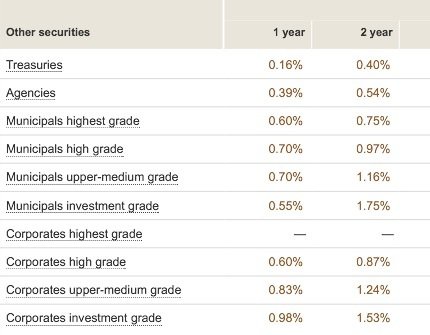Hello:
Can you identify an investment with a likely 2% or greater return and a 2 year investment time horizon. I understand that all investments involve risk, but a low investment risk is of course preferred. If you can't identify a specific investment, you can suggest an asset class (ie. investment grade bond, high yield bond, corporate bond, preferred stock, etc).
I know that CDs and money market accounts, on average, are currently providing a very low rate of return.
Thank you.
Can you identify an investment with a likely 2% or greater return and a 2 year investment time horizon. I understand that all investments involve risk, but a low investment risk is of course preferred. If you can't identify a specific investment, you can suggest an asset class (ie. investment grade bond, high yield bond, corporate bond, preferred stock, etc).
I know that CDs and money market accounts, on average, are currently providing a very low rate of return.
Thank you.

